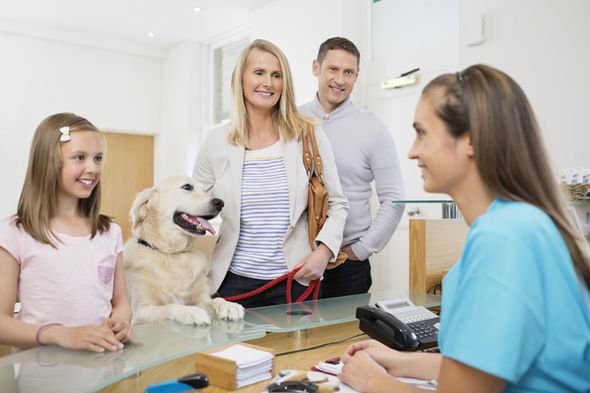Visiting the vet is a fact of life for dogs and their owners. While some of our four-legged friends may not enjoy the experience, it doesn’t have to be traumatic for them.
By following our advice, you can help your pooch feel better about vet visits, from arriving at the clinic to being checked in the examination room.

Make visiting the vet a more positive experience for your dog by taking the time to drop in even when you don’t need to go – perhaps once a week during a walk. You could ask the practice staff to give your dog some tasty treats and a nice fuss each time (but only if you know your dog enjoys this!)
That way, your dog will build up warm, positive feelings about the vet. When your dog next needs to see them, the visit should be less stressful.
One of the things many dogs dislike about visiting the vet is being handled, especially in places they are not used to being touched. You can help your dog by getting them used to being touched long before you go to the vet:
As with so many aspects of dog training, the ‘little and often’ approach tends to work best, so set aside sometime each week and make this part of your playtime.
For further information see our page teaching your dog to be comfortable when handled.
When you visit the vet with your dog, try bringing their favorite toy, blanket, or both. This should help them feel more relaxed and secure.
If you can, sit well away from the door. Dogs can find it difficult to relax near this busy area, so the further away you can be, the better.
It can also be helpful to make sure your dog is facing away, and spaced out from, other dogs. That’ll be easier if you make an appointment for a quieter time at the vet practice.
Gently encourage your pooch to focus on you. This will help them avoid eye contact with other dogs, which is often a cause of tension or frustration within the confined space of a waiting room.
At the vet, you are your dog’s best friend, and they are relying on you to speak up for them. If they get stressed or begin to growl in the examination room, you could politely but firmly ask your vet to stop what they are doing. Both your dog and your vet will thank you for speaking up. Ignoring your dog or telling them off could make the situation worse.
Growling or tensing up are your dog’s way of saying ‘I am really uncomfortable!’ but your vet might be so absorbed with examining your dog that they don’t notice. It’s important to tell your vet what’s happening – after all, you’re the owner, and know your pet best.
A dog may bite during a vet examination because the owner and the vet ignored the dog’s growling, and the dog felt they had no other way to show how unhappy they felt in that situation. Being aware of the different ways your dog is communicating with you will help to make sure every visit to the vet is a happy one.
Wenn Sie diese Seite hilfreich fanden, denken Sie bitte darüber nach eine kleine Spende hinterlassen um uns dabei zu helfen, nützlichere Ratschläge zu erstellen.
Das können Sie auch Melden Sie sich für unseren kostenlosen Newsletter an Für weitere Tipps und Tricks und um über unsere Arbeit auf dem Laufenden zu bleiben.
| Plätzchen | Dauer | Beschreibung |
|---|---|---|
| cookielawinfo-checkbox-analytics | 11 Monate | This cookie is set by GDPR Cookie Consent plugin. The cookie is used to store the user consent for the cookies in the category "Analytics". |
| cookielawinfo-checkbox-funktional | 11 Monate | The cookie is set by GDPR cookie consent to record the user consent for the cookies in the category "Functional". |
| cookielawinfo-checkbox-notwendig | 11 Monate | This cookie is set by GDPR Cookie Consent plugin. The cookies is used to store the user consent for the cookies in the category "Necessary". |
| cookielawinfo-checkbox-others | 11 Monate | This cookie is set by GDPR Cookie Consent plugin. The cookie is used to store the user consent for the cookies in the category "Other. |
| cookielawinfo-checkbox-performance | 11 Monate | This cookie is set by GDPR Cookie Consent plugin. The cookie is used to store the user consent for the cookies in the category "Performance". |
| angesehene_cookie_policy | 11 Monate | Das Cookie wird vom DSGVO-Plugin „Cookie Consent“ gesetzt und dient dazu, zu speichern, ob der Benutzer der Verwendung von Cookies zugestimmt hat oder nicht. Es werden keine personenbezogenen Daten gespeichert. |
Erstellen Sie ein Konto oder melden Sie sich an, um Haustiere zu speichern, die Sie lieben.
Sie haben noch kein Konto? Kontaktieren Sie uns
Bevor Sie mit Ihrem Adoptionsantrag fortfahren, lesen und akzeptieren Sie bitte unsere Datenverarbeitungspraktiken:
Notiz: By clicking "I Agree & Continue", you will be redirected to an external application form. This tracking system logs your interest but does not capture data from the external form.
Erstellen Sie ein Konto oder melden Sie sich an, um Haustiere zu speichern, die Sie lieben.
Sie haben noch kein Konto? Kontaktieren Sie uns
Bevor Sie mit Ihrem Adoptionsantrag fortfahren, lesen und akzeptieren Sie bitte unsere Datenverarbeitungspraktiken:
Notiz: By clicking "I Agree & Continue", you will be redirected to an external application form. This tracking system logs your interest but does not capture data from the external form.